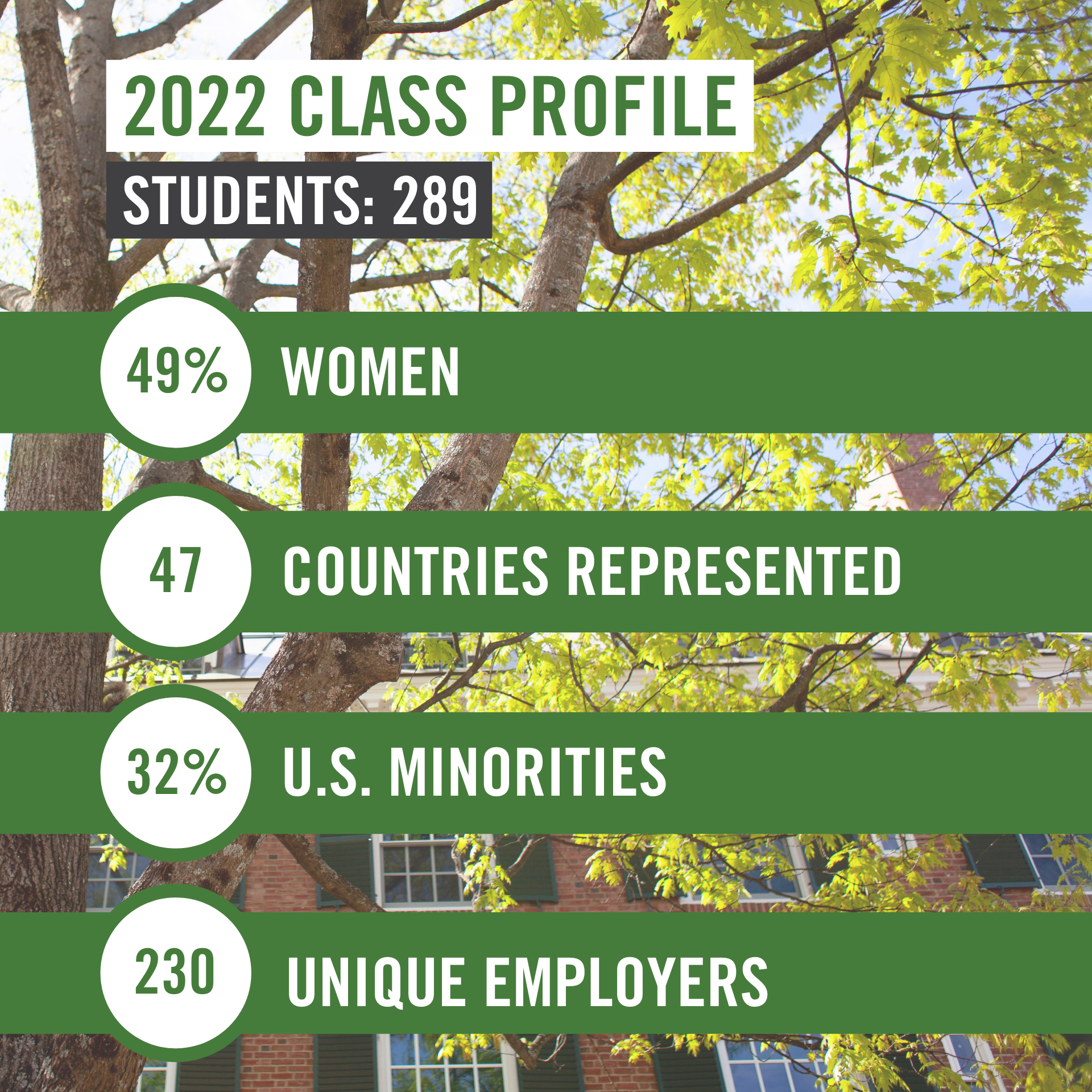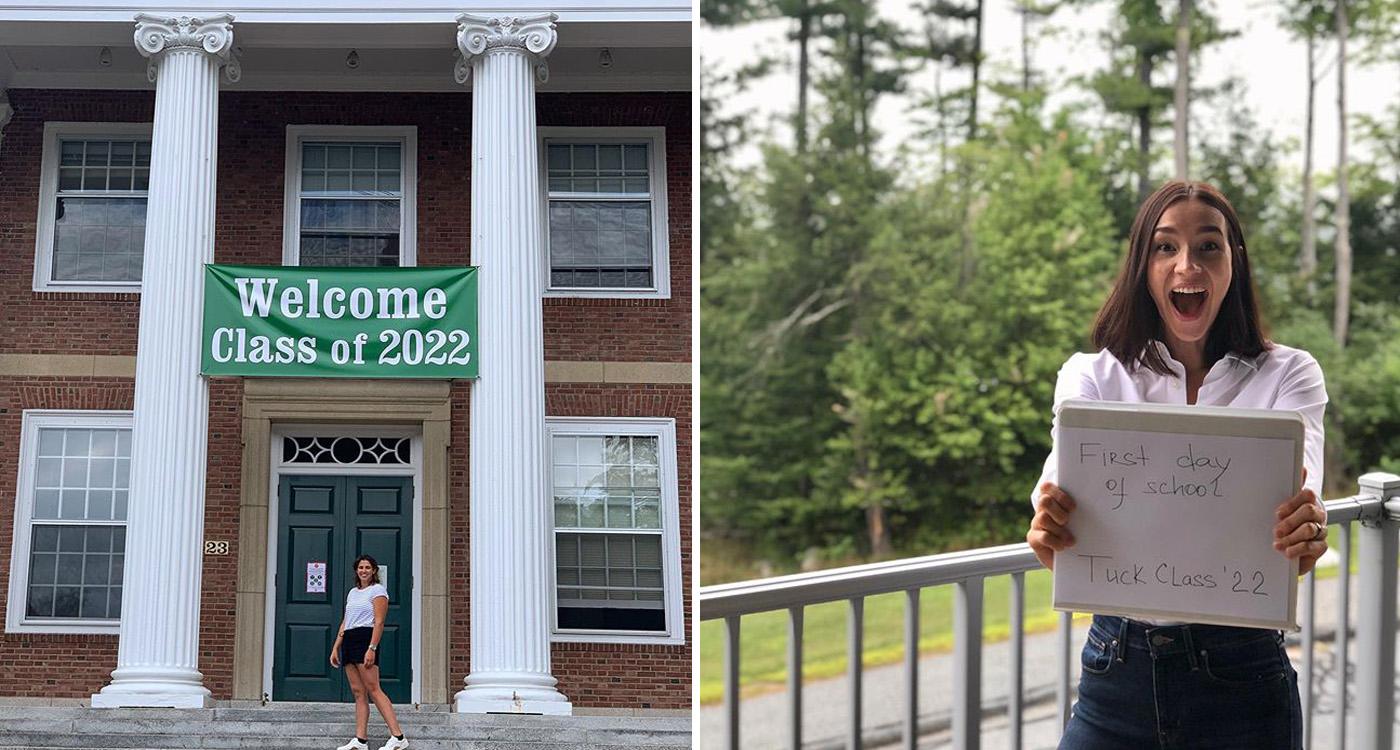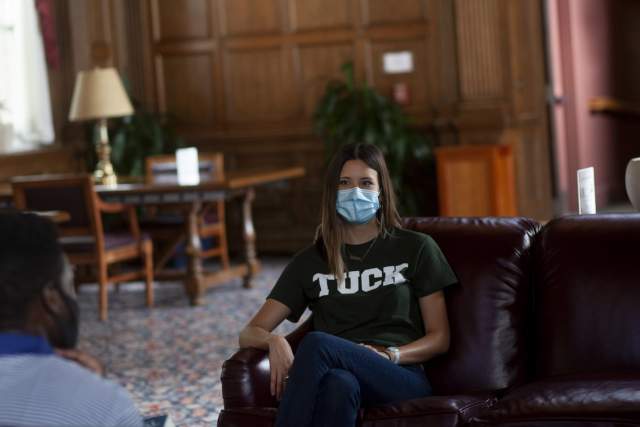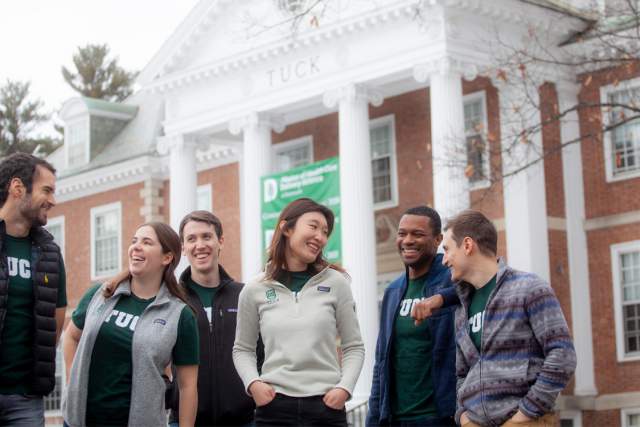Warm greetings, authentically delivered, feel good no matter the distance from where they are sent. On a Wednesday in mid-August, 280 Tuck first-year students experienced that phenomenon when they logged-in to a Tuck Launch session on Zoom with Dean Matthew Slaughter and Professor Ella Bell Smith.
“We are thrilled to have you, and it’s a delight to see you,” Bell Smith said with a smile to the students. They beamed back with smiles and waves of their own, scores of webcam video-feeds showing an eager and diverse cohort of young business leaders.
Bell Smith was at her home in North Carolina, while Slaughter was at his home in Hanover. Many of the T’22s were sequestered in their rooms on campus or in housing nearby, while others were located as far away as China, India, and Brazil. Collectively, they were beginning the school year with emotions ranging from excitement, nervousness, and optimism to apprehension about the unknowns that may lay ahead in a world grappling with a pandemic and a global movement for racial justice. The four-hour session that day was defined in no small part by the new reality. It was conducted virtually, through a well-rehearsed choreography of distance learning technology and Tuck staff, and it was titled “Race, Diversity and Your Life: Now What?” Bell Smith, a scholar on race and gender in business, explained the purpose of the session at the beginning, in case anyone wondered why they were being led through a sensitive subject so early in their MBA experience. “We want to make sure you know how to handle the real hard stuff,” she said.

Tuck Launch, the school’s innovative two-week orientation for incoming students, was created less than two years ago, as part of Tuck’s curriculum review process. It is based on the design principles of integrated programming, experiential learning, and reflection, with the intention of preparing students for the intensity and academic rigor of their first year at Tuck. It debuted last year with the Class of 2021 and was widely considered a success, with students appreciating how it blended self-awareness, leadership development, and academics to provide a sound foundation for the next two years.
For this year, Tuck wanted to keep much of the program intact, but needed to modify it in significant ways to adapt to the Covid-19 pandemic and acknowledge and support the Movement for Black Lives. On a logistical level, the schedule was altered to accommodate students in different time zones, with sessions only running from 8 a.m. to 1 p.m.; evening sessions were optional. Students began learning the Zoom platform as early as the virtual Admitted Students Weekend in April, and through Tuck town hall sessions and Ask-Me-Anythings with the MBA Program Office. They did further training and norm-setting during four pre-Tuck Launch sessions this summer with Joe Hall, the senior associate dean for teaching and learning, reviewing health and safety priorities, the basics of Zoom technology, and online etiquette for classes, which includes showing up early, having your camera on, displaying your full name, and raising your virtual hand to comment. Faculty members and a few T’21s even created a video of a mock class session to show T’22s how everything works. “We needed to make sure day one of Tuck Launch wasn’t spent learning the technology and the process,” Hall says.
More substantively, Tuck Launch featured new sessions that emphasized personal connections and empathy. One example is River of Life, with Dartmouth professor James Rice. The session is based on a Tuck elective course called Communicating with Presence that Rice teaches to second years, where students tell their life story to a classmate, who then reports back on the three life values they heard in the story. It has proven so well-loved that a few T’20s suggested it be part of Tuck Launch. Sydney Finkelstein, the Steven Roth Professor of Management and the faculty director of Tuck Launch, liked the idea but was wary of the risk of having students who just met divulge so much about themselves. So he designed a safety net of sorts. Finkelstein had the T’20s put together a team of coaches who could advise the T’22s. Ultimately, 10 second-years served as coaches, and their office-hours with T’22s were a popular resource. The session not only built bridges between students; their reflections on values become part of students’ leadership values statement that are a component of the leadership coaching program during their first year.
It’s designed to help you think in a less narrow way, taking you out of your shell of who you are and how you think, and opening your mind. Particularly at the beginning of a two-year MBA program, it’s a very important lesson.
The power of storytelling was also a theme of a new session called Narrative Medicine, where students read a poem by an African-American author and then commented on writing style, flow and content. Afterward, they had four minutes to write their “life song,” which they then discussed together. “It’s kind of like doing a seminar in English literature,” Finkelstein says. “There’s an intellectual side to it that is very useful, and there’s an emotional side. But the broader lesson is that the more we notice about what’s around us and who we are, the more effective leaders we’re going to be.”
Another avenue to explore this lesson is visual art, which was the method used in the session Learning to Look. Offered in collaboration with educators at the Hood Museum of Art, students in this session had a conversation about identity from different perspectives, using digital renderings of three works of art from the museum’s global contemporary collection. The Learning to Look method emphasizes objective observation, formal analysis and inquiry, contextual research, interpretation, and personal assessment. Students gathered in small groups in Zoom breakout rooms to practice the method, share their findings, and reflect on their experience. “It’s designed to help you think in a less narrow way,” Finkelstein says, “taking you out of your shell of who you are and how you think, and opening your mind. Particularly at the beginning of a two-year MBA program, it’s a very important lesson.”
A lighter approach to the lessons of storytelling and perspective-taking was evident in the sessions with the Second City comedy troupe called Improv Fundamentals for Communication and Connection. Second City, which is based in Chicago, launched the careers of renowned comedians such as Bill Murray, Julia Louis-Dreyfus, and Amy Poehler, among many others. The troupe also has a school of improvisation with a branch of programs for business executives and MBA students. In the program for Tuck Launch, two Second City staff members and a musician led students through fun exercises that emphasized vulnerability, creativity, and teamwork. The session ended with a valuable reminder, given the times: “Look for opportunities to be playful with one another,” one of the Second City staffers said. “Embrace imperfection. Think of mistakes as gifts.”

"Starting grad school in the middle of a global pandemic was not exactly what I pictured when I was applying to schools last Fall, but I am so excited to finally be here at Tuck and take on these uncertain times with the Class of 2022," Alex Singh T'22 (pictured left) shared on Instagram. Pictured right: Tatiana Ladygina T'22
Creativity was the theme of another new optional session on design thinking, run with the help of T’21s. Second-years and recently-graduated students were more involved in Tuck Launch this year, as a way to help first-years integrate into the community and make connections despite the remote-learning model. In the design thinking program, the project was to create a Tuck face mask. Teams made videos and presented their designs before a panel of faculty and staff judges. “It’s hard to teach creativity,” Finkelstein says, “but it’s such an important skill. We had a huge turnout for this, and I think it really helped students get to know each other and practice being creative.”
It’s a high-pressure situation. They’ve barely started business school and here they are presenting to a CEO without a lot of advance notice.
The capstone to Tuck Launch is the CEO Challenge, where study groups work with alumni CEOs and faculty on a real-world business issue the CEOs are facing. Students are given less than 24 hours to analyze a business case and create a presentation answering the key questions for the business. Last year, the session featured four CEOs who came to Tuck for the event. This year, travel wasn’t a barrier, so nine CEO alumni took part, from companies such as Discover Financial, the Chicago Sun-Times, and King Arthur Baking Company. Robert Wallace T’84, a founder of multiple companies, asked students for help with his economic plan for his mayoral campaign in Baltimore. On the day of the event, all first-years participated, along with the CEOs and about 30 staff and faculty. In a remarkable technological achievement, everyone gathered in a plenary session, then went to virtual break-out rooms with their study groups, which the CEOs and faculty visited to answer questions. In the finale, a few study groups presented to each CEO, and then everyone gathered together again to reflect on the exercise. “It’s a high-pressure situation,” Finkelstein says. “They’ve barely started business school and here they are presenting to a CEO without a lot of advance notice.”
According to the CEOs, the students performed beyond their expectations. Ralph Carlton T'78, the co-CEO of King Arthur Baking Company with Karen Gouse Colberg T’91, remarked: “We felt like we were in the middle of the discussion that we have spent weeks on, but the students spent a day on it, and they came at the issue from many angles. It was really impressive.” Roger Hochschild T’90, the CEO of Discover Financial, said “it must have been a happy coincidence that we had the best and the brightest students in our group, because they were incredible. It’s amazing how much work and thought a small team of Tuck students can do in a quick amount of time.”
The sessions on race and diversity, and River of Life, mentally prepared me to push myself beyond my comfort zone, and enabled me to connect with classmates on a level I couldn’t have reached at any other business school.
By the same measure, Christine Rohacz T’22 was surprised at how much she learned during Tuck Launch. She wasn’t sure what to expect from an intense, two-week-long remote orientation, but it became clear to her early on that Tuck faculty and staff had put a tremendous amount of preparation into running the program smoothly via Zoom. Overall, Rohacz appreciated how Tuck’s preparation facilitated her own preparation for the two years ahead. “A fundamental principle of business school is you need to be willing to let other people have the mic and listen to what they have to say,” she says. “The sessions on race and diversity, and River of Life, mentally prepared me to push myself beyond my comfort zone, and enabled me to connect with classmates on a level I couldn’t have reached at any other business school.” At the end of the two weeks, Rohacz reports feeling both exhausted and grateful. “It was really valuable,” she says.
Having proved that Tuck could deliver a personal, connected and transformative MBA introduction remotely to students near and far, the challenge now is to take those lessons and enhance Tuck Launch for next year, when the school will likely return to its traditional in-person model. “We leveraged Zoom to create something that would be hard to do otherwise,” Finkelstein says. “It has expanded our horizons of what’s possible, and the students showed real flexibility and creativity as we took risks to offer something completely new.”
As the session with Ella Bell Smith and Dean Slaughter on race and diversity came to a close, after hours of sharing perspectives on privilege, prejudice, inequality and injustice, Bell Smith sensed the group needed a call to action. “How will you make a difference?” she asked. “How will you create a world for George Floyd’s daughter so she can have opportunities he didn’t?” She asked everyone to unmute their microphone and say a collective Amen. Voices rang out from Hanover to Hong Kong. “A global Amen!” Bell Smith said.

